Do you have a question about the Pioneer AVIC-7000NEX and is the answer not in the manual?
Information for users regarding software requirements and installation assistance.
Details the importance of reading user information before product use.
Provides an overview of the manual's structure and conventions.
Explains how to find operation procedures and understand manual conventions.
Details conventions used for buttons, menu items, and screen elements.
Defines key terms like 'Front display', 'Rear display', and 'Video image'.
Covers information about memory, data erasure, and microprocessor reset.
Identifies parts and main features of the product using buttons.
Explains how to detach the faceplate to prevent theft.
Provides warnings and cautions for using the LCD panel.
Details procedures for inserting and ejecting discs and SD cards.
Describes the procedures for starting and terminating the system.
Guides through the initial setup process, including language selection.
Explains the process for starting the system after initial setup.
Illustrates how to switch between screens using touch panel keys.
Explains how to navigate screens using the product's hardware buttons.
Lists the sources that can be played or used with the product.
Describes how to access and view the AV operation screen.
Details selecting a front source from the AV source selection screen.
Explains how to change the order of source icons on the AV screen.
Provides guidance on operating the product by touching the screen.
Explains how to change playback points using the time bar.
Details the usage of the on-screen keyboard for text input.
Guides through the initial setup process for the navigation system.
Explains how to operate the navigation menu screen and its keys.
Details how to interpret information displayed on the map screen.
Explains common route event icons and their meanings.
Describes how to view the vehicle's current position on the map.
Explains how to view different data fields during navigation.
Details how to configure lane information and view junction details.
Covers operations like changing map scale and view.
Explains how to switch map orientation and view modes.
Details how to adjust the map's horizontal and vertical view angles.
Describes how to scroll the map to a desired location.
Guides on searching for destinations using street addresses.
Explains how to search for facilities like gas stations and restaurants.
Details searching for emergency or roadside assistance locations.
Explains how to select previously saved locations as destinations.
Guides on selecting previously saved routes for navigation.
Covers accessing recently searched locations via History and Smart History.
Explains how to search for locations using latitude and longitude.
Details how to specify a location by scrolling and selecting on the map.
Covers ways to modify an active route, like checking alternatives.
Explains selecting route alternatives before starting navigation.
Guides on modifying the route by editing the destination list.
Details the steps to cancel the current route guidance.
Explains how to build routes using the Route Planner feature.
Covers getting a map overview and checking route parameters.
Describes how to run a simulated navigation of the current route.
Explains how to save favorite locations for quick access.
Details saving favorite routes for quick re-entry.
Guides on saving map locations as alert points for warnings.
Explains how to enable and receive real-time traffic reports.
Details how to check traffic incidents and their information on the map.
Covers accessing various information menus to support driving.
Guides on configuring navigation settings and system behavior.
Explains how to restore settings and recorded content to default.
Provides details on various settings like Route Preferences and Sound.
Details settings for vehicle type, road types, and route planning.
Covers adjusting volume levels and voice guidance profiles.
Explains how to enable/disable warnings and set alert functions.
Details fine-tuning map appearance and navigation information.
Covers features like Data Fields, Junction View, and Tunnel View.
Explains settings for themes, menu animations, and backlight.
Covers enabling/disabling TMC receiver and traffic functions.
Details enabling/disabling online weather forecast and auto download.
Covers enabling online gas prices and selecting gas types.
Explains settings for trip log saving and track log saving.
Details enabling/disabling connected online features.
Covers enabling/disabling collection of usage information and GPS logs.
Explains modifying basic software parameters used during initial setup.
Details the built-in function for using Bluetooth wireless devices.
Guides on registering devices for the first time via search or pairing.
Explains how to set automatic connection between devices.
Details the procedure to delete a registered device.
Guides on manually connecting a registered device.
Explains how to set the product's visibility to other devices.
Details how to enter the PIN code for Bluetooth connection verification.
Explains the procedure to clear the Bluetooth memory.
Guides on updating the product with the latest Bluetooth software.
Explains how to check the Bluetooth module's software version.
Explains how to access the phone menu via the Phone icon.
Illustrates and describes the touch panel keys for phone operations.
Describes the information displayed on the phone screen.
Details various methods for making a phone call.
Explains how to search for phone numbers using alphabet search.
Guides on dialing numbers from the call history list.
Details how to dial numbers from preset lists.
Explains how to perform hands-free answering of calls.
Describes how to answer or reject incoming calls.
Explains how to minimize the dial confirmation screen.
Covers settings like auto answer, ring tone, and private mode.
Details how to adjust the volume for the other party.
Explains how to use the voice recognition function for iPhones.
Provides general notes and limitations for hands-free phoning.
Outlines the basic steps for connecting and setting up devices.
Guides on selecting the connection method for iPhone/smartphone.
Lists supported iPod models and software versions.
Covers compatibility information for Android devices.
Details compatibility information for MirrorLink devices.
Provides a table of connection requirements and available sources.
Illustrates and describes the touch panel keys for radio operations.
Explains the display elements of the radio screen.
Guides on starting radio operation.
Details how to switch between FM and AM bands.
Explains how to tune radio stations manually.
Guides on using seek tuning to find broadcast stations.
Explains how to recall stored channels from a list.
Details how to store broadcast frequencies to preset tuning keys.
Explains how to use BSM to store the strongest frequencies.
Covers local seek tuning for stations with strong signals.
Guides on storing song information to an iPod via iTunes Tagging.
Explains operations using hardware buttons like TRK.
Describes features of HD Radio stations like audio quality and multicasting.
Illustrates and describes touch panel keys for HD Radio operations.
Explains the information displayed on the HD Radio screen.
Guides on starting HD Radio reception.
Details how to switch between FM bands (FM1, FM2, FM3) and AM.
Explains how to tune HD Radio stations manually.
Guides on using seek tuning for HD Radio stations.
Explains how to recall stored HD Radio channels from a list.
Details storing HD Radio broadcast frequencies to preset keys.
Explains using BSM to store strongest HD Radio frequencies.
Covers local seek tuning for strong HD Radio signals.
Explains how to select the method for seek tuning (Seek All/Seek HD).
Details how to set the reception mode to avoid frequent switching.
Guides on storing song information to iPod for HD Radio content.
Explains operations using hardware buttons for HD Radio.
Illustrates and describes touch panel keys for audio disc playback.
Illustrates and describes touch panel keys for video disc playback.
Covers various playback functions like changing point and file type.
Explains the display elements for audio disc playback.
Explains the display elements for video disc playback.
Details how to play tracks from a disc in random order.
Explains how to set repeat play range for tracks or discs.
Guides on selecting tracks using the file name list.
Explains how to switch between music, video, and CD-DA file types.
Details using search function to find specific parts of disc content.
Explains how to operate the DVD menu directly on the screen.
Guides on switching subtitle languages for discs with multilingual data.
Explains how to switch audio languages for discs with multilingual audio.
Details how to move ahead one frame at a time during pause.
Explains how to slow down the playback speed.
Guides on returning to a pre-programmed point on a disc.
Explains how the bookmark function resumes playback.
Details operating the DVD menu using touch panel keys.
Explains how to switch viewing angles for multi-angle DVD recordings.
Guides on switching audio output for DVDs with LPCM audio.
Explains operations using hardware buttons like TRK for disc playback.
Illustrates and describes touch panel keys for audio file playback.
Explains the display elements for compressed audio files.
Guides on starting playback of compressed audio files from a disc.
Details starting playback from USB or SD storage.
Explains switching between Folder Browse and Music Browse modes.
Guides on selecting files using the file name list.
Details how to play compressed audio files in random order.
Explains how to set repeat play range for audio files.
Guides on switching between music, video, CD-DA, and photo file types.
Explains operations using hardware buttons for audio files.
Illustrates and describes touch panel keys for video file playback.
Explains the display elements for compressed video files.
Guides on starting playback of compressed video files from a disc.
Details starting playback of compressed video files from USB/SD.
Guides on selecting video files using the file name list.
Explains how to set repeat play range for video files.
Details how to move ahead one frame at a time during pause.
Explains how to slow down the playback speed for video files.
Guides on switching between music, video, and photo file types.
Explains operations using hardware buttons for video files.
Illustrates and describes touch panel keys for still image file playback.
Explains the display elements for compressed still image files.
Guides on starting playback of still image files from USB/SD.
Guides on selecting still image files using the file name list.
Details how to play still image files in random order.
Explains how to set repeat play range for still image files.
Guides on switching between music, video, and photo file types.
Explains how to set the interval between images in a slideshow.
Explains operations using hardware buttons for still image files.
Illustrates and describes touch panel keys for iPod audio playback.
Illustrates and describes touch panel keys for iPod video playback.
Explains the display elements for iPod audio playback.
Explains the display elements for iPod video playback.
Details how to shuffle songs, albums, or videos for random playback.
Explains how to set repeat play range for iPod content.
Guides on connecting and starting iPod operation.
Explains how to search for songs or videos from the playlist.
Details controlling iPod functions directly from the connected iPod.
Explains how to change the playback speed for audiobooks.
Guides on opening lists of songs related to the currently playing track.
Explains operations using hardware buttons for iPod functions.
Details playing music from other apps using the iPod source.
Illustrates and describes touch panel keys for iPod operations.
Explains the display elements when using iPod with music apps.
Explains how to control iPhone/smartphone applications directly from the screen.
Illustrates and describes touch panel keys for AppRadio Mode control.
Guides on connecting iPhone/smartphone and starting applications.
Details starting procedure for smartphones via Bluetooth or cable.
Explains how to use the on-screen keyboard for iPhone applications.
Covers adjusting image size for Android devices in AppRadio Mode.
Guides on displaying application images for iPhone with 30-pin connector.
Explains displaying application images for iPhone with Lightning connector.
Covers displaying application images for smartphones not compatible with AppRadio.
Details connecting and controlling MirrorLink devices.
Explains outputting audio from AV source and iPhone/smartphone apps.
Covers requirements, limitations, and operations for Pandora service.
Illustrates and describes touch panel keys for Pandora operations.
Explains the display elements for Pandora stations and tracks.
Guides on connecting iPhone/smartphone to use Pandora.
Explains how to select Pandora stations from the displayed list.
Details how to add new Pandora stations.
Explains operations using hardware buttons for Pandora songs.
Covers requirements, notes, and operations for Aha Radio service.
Illustrates and describes touch panel keys for Aha Radio operations.
Explains the display elements for Aha Radio stations and content.
Guides on connecting iPhone/smartphone to use Aha Radio.
Explains operations using hardware buttons for Aha Radio content.
Details the process of activating the iDatalink Maestro adapter.
Explains how to check the device number for firmware flashing.
Guides on updating the Maestro module firmware.
Covers starting procedures for USB/iPod and SiriusXM with iDatalink.
Explains how to set up Bluetooth connection for hands-free phone.
Describes the functions and display of the Phone Book screen.
Explains how to view and use the call history list.
Details the dial pad, private mode, and call functions.
Explains the functions of the dial confirmation screen.
Covers controlling a Bluetooth audio player via the product.
Illustrates and describes touch panel keys for Bluetooth audio player control.
Explains the display elements for Bluetooth audio player playback.
Guides on connecting and starting Bluetooth audio player operation.
Explains how to select track titles from the file name list.
Details how to play Bluetooth audio files in random order.
Explains how to set repeat play range for Bluetooth audio files.
Explains operations using hardware buttons for Bluetooth audio player.
Covers operations for the SiriusXM Connect Vehicle Tuner.
Guides on selecting SiriusXM as source and checking Radio ID.
Illustrates and describes touch panel keys for SiriusXM tuner operations.
Explains the display elements for SiriusXM tuner.
Guides on starting SiriusXM tuner operation.
Explains how to tune SiriusXM channels manually.
Explains how to recall stored SiriusXM channels from a list.
Details storing SiriusXM broadcast channels to preset keys.
Guides on selecting a SiriusXM channel by entering the number.
Explains how to select a channel from the list of all available channels.
Guides on selecting a channel from available categories.
Explains how to switch between different list types.
Details the Replay function for pausing and controlling audio.
Explains automatically starting songs from preset channels.
Covers hearing song previews from preset music channels.
Explains how to set parental controls for inappropriate channels.
Guides on locking specific channels using a passcode.
Explains how to get alerted for favorite songs, artists, or games.
Details how to store favorite sports teams for Game Alerts.
Explains how to reset SiriusXM settings to their default values.
Guides on storing song information from SiriusXM to an iPod.
Explains operations using hardware buttons for SiriusXM tuner.
Explains displaying video from connected devices via HDMI.
Illustrates and describes touch panel keys for HDMI source operations.
Explains the display elements for HDMI source.
Guides on starting HDMI source operation.
Explains displaying video from connected devices via AUX.
Illustrates and describes touch panel keys for AUX source operations.
Explains the display elements for AUX source.
Guides on starting AUX source operation.
Details setting the video signal for AUX input (PAL, NTSC, SECAM).
Explains switching between screens for music and video files.
Explains displaying video from connected devices via AV input.
Illustrates and describes touch panel keys for AV input operations.
Explains the display elements for AV input.
Guides on starting AV source operation.
Details starting procedure for displaying camera image.
Guides on setting the video signal for AV equipment.
Explains MIXTRAX technology for creating non-stop music mixes.
Illustrates and describes touch panel keys for MIXTRAX.
Guides on specifying items to play related songs.
Explains how to select items or songs not to be played.
Details how to specify the playback portion of songs.
Explains how flashing colors change with sound and bass levels.
Covers setting display of guidance information on the AV operation screen.
Explains automatic switching to navigation screen from AV/AppRadio.
Guides on activating the Bluetooth audio source for player usage.
Details setting recorded text information to scroll continuously.
Explains using external video equipment with the product.
Covers functions for utilizing a separately sold rear view camera.
Guides on activating the rear view camera function.
Explains how to set the polarity of the rear view camera.
Details setting Camera View mode to 'On' for constant display.
Explains how to display parking assist guidelines.
Guides on adjusting guidelines by dragging points on the rear view image.
Explains the procedure to turn off the demo screen.
Covers selecting the user interface and message languages.
Guides on setting the keyboard language for iPhone in AppRadio Mode.
Explains how to turn the beep tone on or off.
Details adjusting touch panel response positions for accuracy.
Covers adjusting picture settings like brightness, contrast, and color.
Explains how to display the product's firmware version.
Guides on updating the product's firmware using an SD card or USB.
Covers checking sensor learning status for distance and turns.
Details how to delete learned results for Distance, Speed Pulse, or Learning.
Explains how to check lead connections and their positions.
Explains how to select fader/balance settings for ideal listening.
Details adjusting the balance between right/left sound output.
Covers automatically muting or attenuating volumes for guidance.
Explains adjusting volume levels for each source to prevent radical changes.
Details adjustments for reproduced frequency band and speaker characteristics.
Covers setting the frequency range for sound output from front/rear speakers.
Explains how to turn the subwoofer output mechanism on or off.
Guides on selecting a listening position for sound effects.
Details fine adjustments of speaker output levels by listening.
Explains correcting time alignment by adjusting speaker distance.
Covers how ASL monitors varying noise and increases volume.
Explains how to adjust equalization to match vehicle acoustics.
Details adjusting the currently selected equalizer curve.
Guides on automatically adjusting equalizer curve based on vehicle acoustics.
Provides precautions and preparation steps before performing Auto EQ.
Details the steps involved in performing Auto EQ measurement.
Explains selecting background displays from presets or external devices.
Guides on changing background display using images from USB/SD.
Covers selecting illumination colors from presets or creating custom colors.
Explains how to select a theme color from different options.
Guides on selecting clock images for the AV operation and Top menu screens.
Explains how to change the splash screen to other preinstalled images.
Guides on changing the splash screen using images from external devices.
Explains exporting Theme settings to an SD memory card.
Guides on importing Theme settings from an SD memory card.
Covers assigning priority languages for subtitle, audio, and menu.
Guides on setting a desired subtitle language for disc playback.
Explains how to set the preferred audio language for discs.
Guides on setting the preferred language for disc menus.
Covers setting the angle icon to appear on switchable angle scenes.
Explains setting the aspect ratio for optimal display on rear screens.
Guides on setting parental lock levels to restrict scenes.
Explains how to generate a DivX VOD registration code.
Guides on displaying the deregistration code for DivX VOD content.
Explains automatic playback of DVDs from the first chapter.
Details selecting the suitable video signal setting for rear view cameras.
Explains how to register menu items as shortcuts for quick access.
Guides on selecting a menu item to add to the favorite menu.
Details how to remove a menu item from the favorite menu.
Explains how to change the date display format and time format.
Guides on storing song information to iPod when receiving song data.
Details how the Sound Retriever function enhances compressed audio.
Explains how to set the screen size for video and JPEG images.
Explains choosing to show the same or a selected source on the rear display.
Covers setting a password for the product to prevent theft.
Provides instructions on what to do if the password is forgotten.
Explains methods to restore settings and recorded content to default.
Details how to reset various settings to their default values.
Lists common problems, causes, and solutions for system operation.
Details specific issues related to the AV screen's functionality.
| Brand | Pioneer |
|---|---|
| Model | AVIC-7000NEX |
| Category | Car Receiver |
| Language | English |
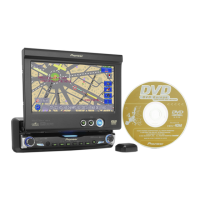
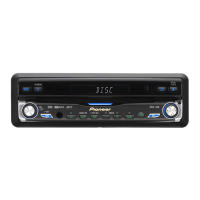
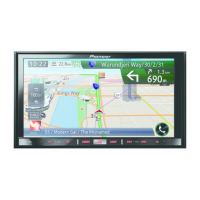
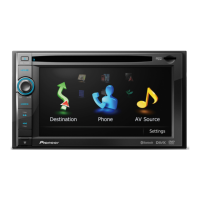


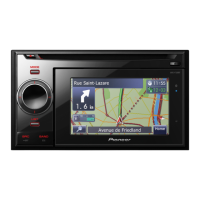
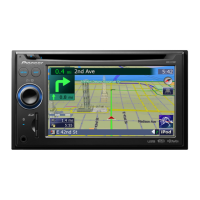


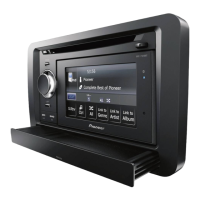

